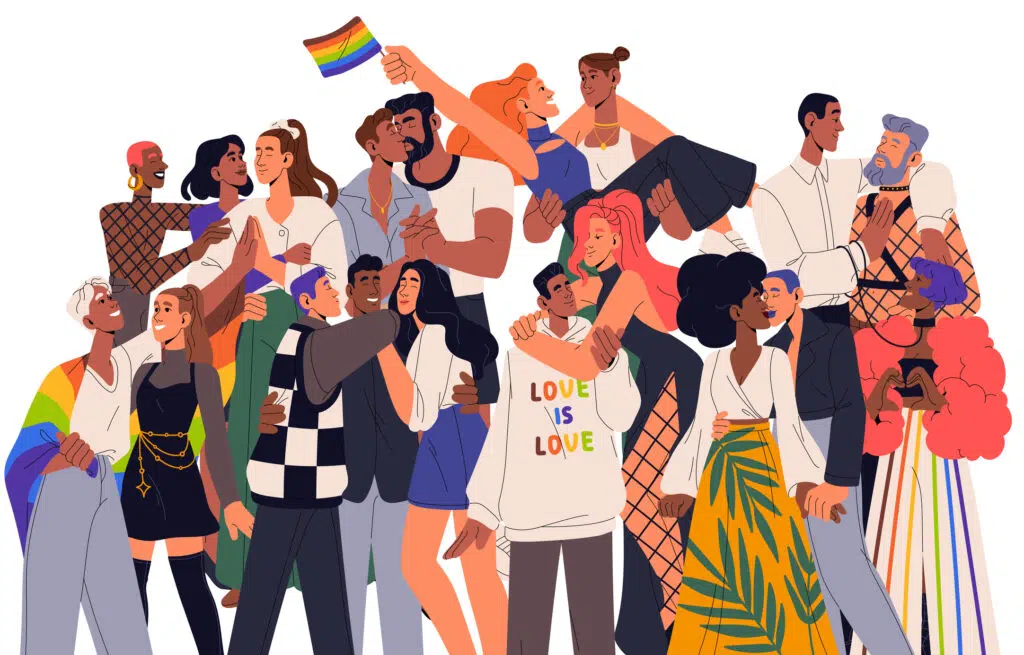How To Find An LGBTQ+ Friendly Therapist In NYC

LGBTQ teens are more likely to suffer from depression, with mental health struggles in LGBTQ adults higher than in non-LGBTQ adults regardless of age. For many LGBTQ individuals, it can feel like there is a barrier to receiving mental health support as it can be hard to find a therapist who is immersed in the community and LGBTQ+-literate. If you’re looking for LGBTQ counseling in NYC, here’s how you can find an LGBTQ-friendly therapist who specializes in LGBTQ issues to support your mental health journey.
LGBTQ Mental Health Statistics
LGBTQ+ stands for lesbian, gay, bisexual, transgender, and queer/questioning. It’s an acronym that describes a range of sexual and gender identities. Over time, it’s expanded further to be more inclusive, with LGBTQIA+ and LGBTQ2+IA being used to include intersex and asexual people. The “+” represents room for growth and inclusion and that many don’t fit it a traditional category of identity or gender.
In the United States, LGBTQIA individuals are three times as likely to experience a mental health disorder. When you couple that with a community that typically deals with adversity, from harassment and discrimination to prejudice and the denial of civil rights, it can create complex problems.
The numbers surrounding LGBTQ mental health are clear:
- Almost half of transgender people have considered suicide
- 1 in 8 LGBTIQ+ people between 18 and 24 have attempted to take their life
- 48% of LGBTQ+ youth report engaging in self-harm
New York’s LGBTQ+ residents are twice as likely to experience mental health illness and three times as likely to suffer from substance abuse problems than their straight counterparts. Considering that more than 750,000 LGBTQ+ people call NYC home, there’s a need for LGBTQ-friendly therapists and mental health professionals who understand the unique challenges and issues the community face.
Why It’s Important To Find An LGBTQ+ Friendly Therapist
Stigma, homophobia, transphobia, and discrimination are all things that LGBTQ+ people continue to face in the workplace, in public, and in their personal lives. When it comes to LGBTQ+ mental health care, a lack of cultural sensitivity and unconscious or conscious reluctance to address sexuality may impact the effectiveness of treatment.
It’s important to recognize that LGBTQ+ individuals have specific needs that need to be addressed by someone sensitive and understanding of the community and its challenges, such as:
- Difficult coming out experience
- Social rejection and isolation
- Biphobia, homophobia, and transphobia
- Discrimination
- Misconceptions
Ultimately, when you speak to a therapist, you need to feel comfortable talking about uncomfortable and painful topics. It can feel almost impossible to talk about a hard subject in an unaccepting environment. If you feel judged, not accepted, or someone just doesn’t understand the LGBTQ+ community, it will be difficult to move forward and put in the work needed for therapy to be effective.
A therapist who understands your background and identity can relate to and encourage you to feel heard and accepted setting the foundation for openness. Whether you’re experiencing anxiety or symptoms of depression, a deep understanding of your identity means that you spend less time explaining your terminology or why you feel a certain way and can jump into the core of a therapy session where you can progress.
What Qualifies A Therapist As LGBTQ+ Friendly?
So, what qualities should you look for in an LGBTQ+-friendly therapist or psychologist?
When looking for an LGBTQ-friendly therapist, you’ll need to think about what’s most important for you. Some individuals might prefer a therapist who identifies as LGBTQ+ and lives and breathes the worst and best parts of being LGBTQ+. If that’s not a deal breaker for you, plenty of mental health professionals specialize in LGBTQ+ issues.
As you search for a therapist, look for someone who talks about LGBTQ+. Whether you are talking about LGBTQ+ issues or not in therapy, knowing that you are speaking with someone sensitive to these issues can help you to feel more comfortable and honest.
How To Identify And Vet Potential Therapists
If you’re wondering what is the best to find a good therapist in NYC who is sympathetic to LGBTQ+ issues, it’s important to take your time and think about what’s essential for you. Naturally, most people start their search by Googling “LGBTQ-friendly therapists near me,” but this can hit you with an overwhelming amount of results.
To identify potential therapists, start by looking at client focus and specialties. For example, if you’re experiencing relationship issues, you will likely choose a therapist with expertise in this area. So, your therapist could be a couples therapist specializing in queer and transgender issues. A couples therapist who understands your relationship dynamic and issues that you may face and uses inclusive language from the very first interaction will likely make you feel more comfortable in a therapy setting.
There are several benefits of speaking with an LGBTQ or LGBTQ-affirming therapist as they are already familiar with social implications, gender-affirming care, and the additional stresses that come with identifying as LGBTQ+.
Other elements to look for include the type of therapy, mental health condition treated, qualifications, and experience. Logical factors will get you so far, but how you feel after an initial conversation can help you to determine the best choice for you.
Some potential questions for therapists when vetting includes:
- What is your experience in the LGBTQIA+ community?
- How many clients have you worked with the same needs and concerns?
- What training have you completed to specialize in working with LGBTQ+ people?
- Can you explain your therapeutic approach?
How To Research An LGBTQ-Friendly Mental Health Professional In NYC
You can use psychologist directories like The American Psychological Association to start narrowing down your search in NYC. You can also use our Therapist Matchmaker Survey to find the best match for you. Whether you live in Manhattan, the East Village, or Greenwich Village, we can help you find the right mental health professional to support your needs. As therapists can only work with people who live in states where they hold a license, make sure to look for a therapist in New York.
Another option is to ask a close friend or family member for a recommendation. Your community is a great resource, and it’s helpful to know if someone had a positive experience with a potential therapist of yours.
Here are some valuable LGBTQ+ mental health resources:
- The National Center for Transgender Equality – advocates for change in policies and society to increase understanding and acceptance of transgender people.
- The Trevor Project – the world’s largest suicide prevention organization for LGBTQ young people.
- The National Queer and Trans Therapists of Color Network – work to transform mental health for queer and trans people of color with a list of crisis hotlines, online support, and directories to help you find the help you need.
- The Association of Gay and Lesbian Psychiatrists – an organization that advocates and educates LGBTQ+ mental health issues.
- The Office of Mental Health, New York State – lists resources for help, education, and how to create safe spaces at work.
Preparing for Your First LGBTQ Counseling Session
Whether you’re visiting a therapist in SoHo or using online therapy from the comfort of your home, it can help to prepare a little, especially if it’s your first therapy session.
Below are some things you can do to help you prepare for your first therapy session:
- Prepare questions to ask your therapist
- Set realistic expectations of therapy
- Be ready to share honestly
- Set aside some downtime for after your session
Remember that going to therapy is an achievement, so be kind and patient with yourself as progress takes time. If you’re struggling with your mental health, speak with a therapist specializing in LGBTQ+ issues at Thriving Center of Psychology. Our team is rigorously vetted to offer the highest level of care and respect. Book an appointment online or call one of our New York offices in SoHo or Midtown.

Sustaining Love: What to Do When the Honeymoon Phase Fades
There’s nothing quite like that initial attraction and spark where you just can’t get enough of your partner. But as the months and years roll on, it’s normal for relationships to transition through stages, and dynamics can shift.

All a Bad Dream? 1 in 4 Think Their Nightmares Predicted the Future
Americans have a lot on their minds. From navigating daily stress due to work or mental health to grappling with bigger widespread issues like politics, climate change, or crime, it’s safe to say there’s a lot to think about daily. For many, stressors aren’t only encroaching on their minds during waking hours, but also when they try to sleep in the form of nightmares, or bad dreams.

Psychological Challenges with Remote Working
While we can meet our loved ones in person without masks, the pandemic brought some changes that have stuck. Remote working has transformed the workforce. Some companies have chosen a fully remote approach, while others are welcoming their employees back to the office full-time.

Survey: 72% of Americans are Stressing About the Upcoming Presidential Election
Political viewpoints in the U.S. have always been contentious, but is the impact of politics in the United States making it difficult for people to live their everyday lives? With some anticipating another brutal and long campaign season ahead of the upcoming 2024 presidential election, nearly half of Americans say politics is negatively impacting their mental health.




